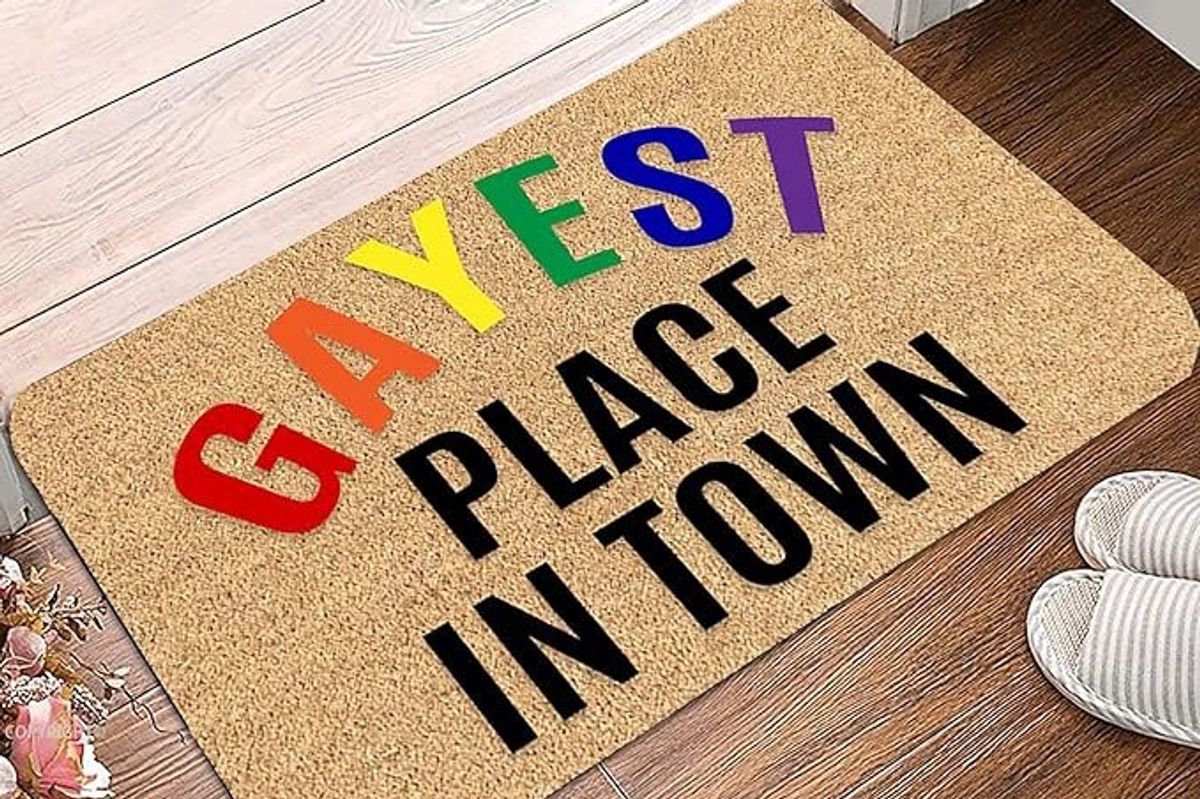Man has the best response after being 'offended' by his neighbor's LGBTQ pride doormat
"I'm writing to let you know that I find your doormat to be extremely offensive.”
A "Gayest Place in Town" doormat.
A TikTok user named Clay came back from a bar and was walking on the third floor of his apartment complex when he came across something that offended him to the core: a doormat in front of an apartment building with the legend “Gayest place in town” on it.
"I don't like that at all," Clay joked in a TikTok video with nearly two million views. “Because it implies that my place is not the gayest place in town." He quickly ordered himself a "Gayest place in town" doormat and then taped a piece of paper with “2nd” written on it so the competing doormat now read: "2nd gayest place in town." He also attached a longer note that included a challenge: "Hello downstairs Gay-bor(s), I'm writing to let you know that I find your doormat to be extremely offensive. I personally believe that MY apt is the gayest place in town and I hereby challenge you to a gay-off,” the letter read, which also contained his TikTok user name.
@claygaiken And my place IS the gayest place in town 😤😤😤🏳️🌈💅🏻💁🏻♂️
Man challenges neighbors to a Pride Month gay-off
Clay challenged the offending residents, who he'd learn are Lauren and Cara, a lesbian couple, to a gay-off. "HEY THAT'S MY DOORMAT, HEY NEIGHBOR!” Lauren responded to the TikTok. You will be hearing back from us,” she added. “I look forward to it,” Clay confidently responded. The lesbian couple shot back with a letter on Clay's doorstep that read: "Hi Gay-boy, we have no clue what this entails, but it sounds gay, so naturally we are in—Cara & Lauren."
Commenters on Clay’s TikTok page were excited that the gay-off was on, but some hoped that he was competing with a man. “You need to put out gay decor and then you and your neighbor keep trying to outgay each other's decor and then idk enemies to lovers y'all fall in love,” one person wrote in the comments.
"Everyone assumed the other apartment belonged to a gay man and hoped for an 'enemies to lovers' situation," Clay told Newsweek. "But I had a strong suspicion it was lesbians. I mean, I used to joke that the third floor was the lesbian floor."
Clay posted a follow-up video showing the lesbian couple's response, and they didn’t hold back.
@claygaiken Replying to @Shareda Mills team Lesbians, you’re up 👀@Lauren Bishop @calabrese101
Clay let the commenters choose the winner, and they overwhelmingly chose the lesbian couple. “We’re sorry, but RAINBOW TINSEL?! Your decor is cute, but they came to WIN,” one commenter wrote. "Yeah, I mean, the door thing they put up is very eye-catching, yours is cute... but... I think they have this round,” another added.
Compared to the lesbian couple, Clay's approach was more subtle. His decor included two small signs that said "Homo Sweet Homo" and "Just a heads up, its really gay in here" and two pride flags taped to the door. But, if you wanted him to win, don't feel bad just yet, there’s still a chance for a comeback. He told Newsweek that he plans on keeping the gay-off going throughout Pride Month. Plus, who knows, this could just be the beginning; next year, they may have to challenge each other to see who has the gayest place in their building once more.

